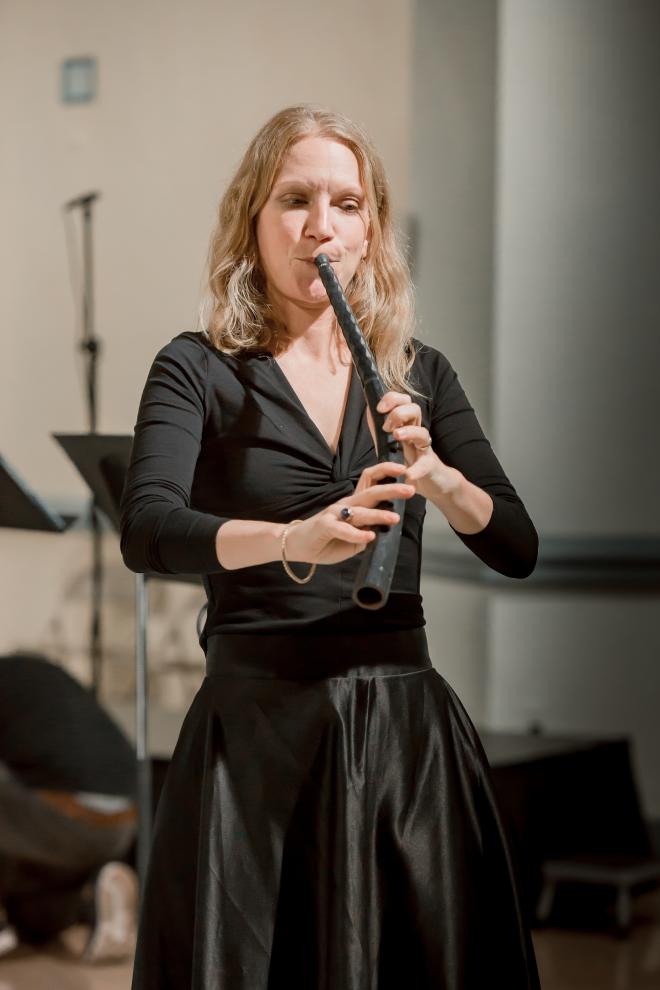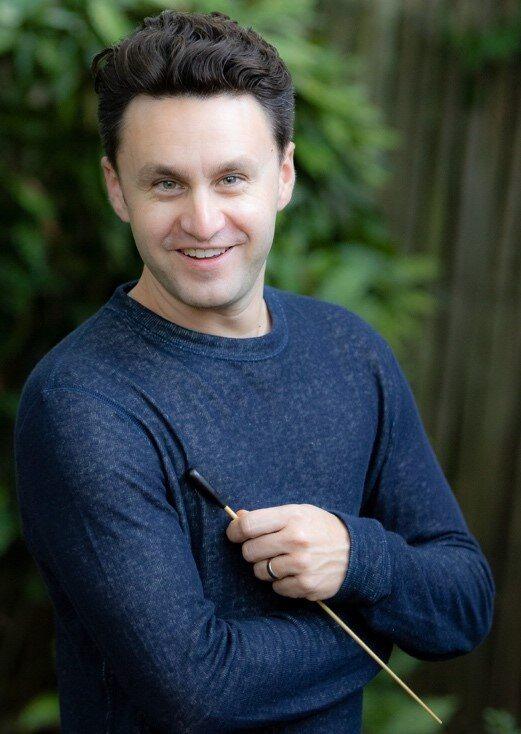Matthew Robertson, Artistic Director of The Thirteen, writes a guest blog sharing his process and experience of recording The Thirteen's latest release, Monteverdi: The 'Lost' Vespers. Choral Showcase will be featuring this recording on January 5.
With controversy his constant companion, Claudio Monteverdi (1567 – 1643) spent his life pioneering an inventive new style of music-making. This style, which he named seconda prattica—and whose hallmarks were a new theatricality, clarity of text setting, and a streamlined harmonic underpinning—would become the foundation of the Baroque period in musical history, inspiring composers from Schütz to Handel, and Vivaldi to Bach.
Most classical music lovers know Monteverdi (if they know him at all) through his famous Vespers of 1610, or perhaps from one of his operas, such as L’Orfeo or L’incoronazione di Poppea. Yet this prolific composer wrote many other works deserving of attention, many of which are just now beginning to rise to prominence.
In 2018, I found myself playing through just such a collection: Monteverdi’s Selva morale et spirituale of 1640-1. A large publication from the last years of his life, Selva morale e spirituale (“The moral and spiritual wood”) contains nearly five hours of the composer’s most inventive church music, in various vocal combinations and instrumentations. This is music that is every bit as vibrant as the composer’s 1610 Vespers but that gives us an opportunity to experience this master composer in his late style. My enthusiasm for Selva began a five-year exploration of Monteverdi’s late compositions with The Thirteen, eventually expanding to include his Messa a quattro voci et salmi (1650) and Madrigalie e canzonnette (1651). These latter volumes were published a full seven years after Monteverdi’s death, an act that was undoubtedly a testament to the esteem in which his colleagues held him and his late music (and their desire to capitalize on Monteverdi’s reputation).
The Thirteen’s ‘Lost’ Vespers found on this recording is not a new discovery of a unified work that has been lost to the passage of time, but rather a curated compilation of music that has been hiding in plain sight of the last 350 years. This album is the result of five years of programming, rehearsing, and performing this music. I’ve chosen the finest of Monteverdi’s late works to present a program that is vespers-like in its effect; of bringing the day to a close in an alternating narrative of lightness and darkness, celebration and reflection. To do this, I’ve drawn nearly exclusively from Monteverdi’s Selva and Missa et salmi, with the lone exception being the brief opening choral chant that I constructed with inspiration from the festive fanfares from Monteverdi’s 1610 volume.
The act of performing and recording is no less fascinating that the act of compiling the music to be played and sung. For one, Monteverdi gives us far less information in his notated music than modern composers do. The bottom line (staff) of music is the basso continuo. It comprises one line of notes that forms the harmonic underpinning for the music. But Monteverdi doesn’t tell us which instrument should play this line of music! Luckily, we can take our clues from what instruments were common and what other composers said should play basso continuo lines: organ, theorbo (a supersized lute), harp, a cello-like instrument (cello, gamba, violone, etc.), harpsichord, and more. For this production, I decided on a basso continuo section that features theorbo, organ, and cello.
The rest of Monteverdi’s musical notation provides little additional information. There are no metronome markings or tempo indications and no dynamics, and although the clues are in the music (ascending lines generally get louder, the opposite for descending; when the text is lyrical, the music is less driving, etc.), these decisions are ultimately up to the performers to make.
Also of note is the pitch for this recording. Modern orchestras tune concert “A” to 440 Hz. (Many now tune a little higher, to 442 or even 446 Hz, but 440 Hz is still considered standard.) Classical orchestras in the time of Mozart and Haydn tuned to 430 Hz (about ½ of a half-step lower than modern). Prior to the Classical period there was substantial variability in how many Hz constituted an “A,” as often the standard would be localized and determined by the pitch of each village’s organ. And so, while many associate the Baroque, and particularly the German Baroque, with A= 415 Hz (roughly G# in modern pitch), this was not standard during the time. (For instance, in 18th Century France A=392 Hz, almost a minor third lower than modern.) Monteverdi’s music should be played at A=465 Hz (a sharp A# in modern pitch), correlating to the organs of 17th century Venice. Typically, historically informed players have instruments that play at 415 and 440, but it took a good deal of work with our string players to ensure that they would have instruments and strings that played beautifully at A=465. Our cornettists (cornettos create sounds that are somewhere between an oboe and a trumpet, with an appearance closer to the former, but with holes instead of keys) had to instruments specific to this pitch. While our efforts to perform at historically informed pitch were not without practical challenges, the benefit is in the golden, effervescent, and shimmery soundworld that we achieve.
Monteverdi spent most of his life working at the basilica of San Marco in Venice, which, as anyone who has visited can attest, is a large and reverberant space. Monteverdi made full use of this sonic landscape, with frequent use of echo, antiphonal choirs, and more spatial effects in his music. While a trip to record at San Marco may have been nice, it was far more practical and equally congenial to record this album at the Franciscan Monastery in Washington, D.C. As a large space with a 14 second echo, this was as close an approximation of Monteverdi’s acoustic as is possible in metropolitan Washington, and The Thirteen is deeply grateful to the Franciscans for hosting us. Dirk Sobotka, our recording engineer from SoundMirror, expertly placed microphones and created the best mix to capture the music we made in this space.
The true delight of this project was the act of rehearsing, performing and recording this music with many of the finest musicians of this genre; I’m grateful to my colleagues for their endlessly inventive music-making and their kind hearts. And, with this album that was recorded in October 2023 and released in May 2024, I am glad to share the fruits of those labors.
American conductor Matthew Robertson (b. 1986) is the founder and driving force of the professional choir and orchestra The Thirteen, which he has led in more than two hundred concerts, two dozen concert tours, nine commercial recordings, and numerous world premieres. Noted for boundary-defying performances that “transfigure the listener” (The Washington Post), for his “incisive tempos and dramatic pacing” (Washington Classical Review) and “flowing lines and dramatic climaxes”(Fanfare Magazine, UK), Robertson’s boundless artistic vision has led to acclaimed performances of a vast and varied repertoire, often featuring inspired use of staging and multimedia and to The Thirteen’s winning the Most Creative Programming Award from the Greater Washington Area Choral Music Awards.
Recognized as a leader in the field, Robertson advances the frontier of vocal music performance, reimagining music from the entirety of the classical music canon. Equally at home in well-loved classics and contemporary works, Robertson tackles works by Renaissance and Baroque masters and contemporary composers with equal skill. For example, Robertson’s curation of Monteverdi’s end-of-life magnum opus Selva morale resulted in concerts in The Lost Vespers series, while his performance of contemporary composer David Lang’s the little match girl passion was praised by Anne Midgette of The Washington Post: “In contrast to the Tallis Scholars’ slightly dry sound, The Thirteen sings with striking color and richness.” Robertson’s passion for reinterpreting masterpieces has led to staged performances of J.S. Bach’s St. John Passion and Johannes Brahms’ Requiem, and the use of projected images in Kile Smith’s The Consolation of Apollo, Scott Ordway’s The Outer Edge of Youth, and the Washington, D.C. premiere of Talbot’s Path of Miracles.
Drawing on his deep commitment to addressing important issues of our time, Robertson’s programming frequently tackles the topics of ecology and systemic racism. His concerts Sing Willow (2020), From Tree to Shining Tree (2019), and Ordway’s Outer Edge of Youth (2022) addressed the existential threat of climate change. His staged 2021 performance of J.S. Bach’s St. John Passion addressed the theme of systemic racism and was called “an indictment of injustice” (The Washington Post). He frequently commissions underrepresented voices, including composers Juhi Bansal, Melissa Dunphy, Lori Laitman, Hilary Purrington, Trevor Weston, and Jonathan Woody. In 2019 he created The Thirteen’s Vocal Fellows Program, an initiative for young singers from underrepresented demographics that debuted in 2021.
Committed to fostering the next generation of musicians and music lovers, Robertson has led educational residencies at more than twenty colleges and universities, including Yale University and The University of Maryland – College Park, where he led a staged performance of Johannes Brahms’ Requiem. He has also directed educational outreach for young people throughout the Washington, D.C. region, including with the LGBTQ+ teen choir, GenOUT.
Robertson’s growing discography with The Thirteen of nine commercially released albums, including the recently released Monteverdi: Vespers of 1610 with Dark Horse Consort and the Children’s Chorus of Washington and The Outer Edge of Youth, of which Gramophone wrote “…Robertson’s pacing is faultless, and he shows how silences and breaths are as important in this music as the notes themselves." He enjoys a fruitful relationship with Acis Records: Truth & Fable received four stars from Choir & Organ and Fanfare when it was released in September 2019, and recently released Monteverdi: The ‘Lost’ Vespers with them in 2024.
Robertson also serves as Director of Music at Bradley Hills Church in Bethesda, MD. Leading the Bradley Hills Choir and Orchestra of the Hills, Robertson has performed much of J.S. Bach’s oeuvre, the requiems of Brahms, Duruflé, Fauré, and Mozart, Arvo Pärt’s Passio, Buxtehude’s Jesu membra nostri, Carissimi’s Jephte, and many other masterworks. Robertson is a Trustee of the Denyce Graves Foundation and has also served on the Board of the DC area chapter of the American Choral Director’s Association and on the faculty of Oberlin’s Baroque Performance Institute. Robertson holds a M.M. in conducting from Westminster Choir College in Princeton, NJ, where he studied with Andrew Megill and Joe Miller, and was the Robert P. Fountain scholar at Oberlin Conservatory where he studied with Bridget Reischl and Robert Spano. A native Washingtonian, Robertson’s early musical formation included studies with Norman Scribner and J. Reilly Lewis.
PBS PASSPORT
Stream tens of thousands of hours of your PBS and local favorites with WETA+ and PBS Passport whenever and wherever you want. Catch up on a single episode or binge-watch full seasons before they air on TV.

